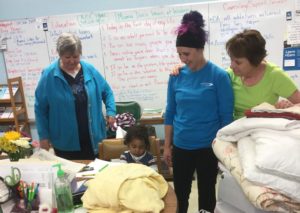Second in a series on Linn County-based Fresh Start Ministries
Maridee Duggar won’t like that I started this column with her name. Yet there’s no other logical way to launch a discussion about Linn County’s RISE program.
The Reintegration Initiative for Safety and Empowerment program largely was born from Duggar’s two decades of volunteerism at the Linn County Correctional Facility on behalf of Fresh Start Ministries.
She understood that if former jail inmates were going to transition successfully into communities — and if communities were going to reap the benefits of the successful transitions — those communities would need to offer guidance and support.
With that understanding, she began to plan.
“I was just one person who had some insight based on experiences with the chaplaincy program. Many of us close to the issues knew something more was needed — maybe I just spoke the loudest and stuck with it,” Duggar said.

RISE provides resources to people newly released from the Linn County Correctional Facility. It’s an idea that grew significantly during the summer of 2014, when several local agencies formed the Linn County Recidivism Committee and began to explore a Minnesota-based pilot program that showed promise.
Initial funding included grants from the Sisters of Mercy and the Greater Cedar Rapids Foundation, and the RISE program was implemented in January 2015. Linn County also chips in, providing about $30,000 in operating costs.
Duggar coordinated the program then, as she does now, and a core group of 12 “navigators” were established as case workers.
From the beginning, the group has emphasized basic necessities — food, shelter, transportation and communication. But services also encompass access to medication, collaboration with support groups like Alcoholics Anonymous and referrals to substance abuse and behavioral health treatment programs.
“The purpose is to keep people from reoffending,” Duggar said. “About a third of people here in Iowa, if they are released from jail without any support, will soon return to jail. That’s not healthy for the individual, and also not healthy for our community. We believe that we can do better, that we can help people reintegrate, that we can make our community more productive and safe.”

It’s working. Nearly 80 percent of those who join the voluntary program do not reoffend. Individuals get a new start and the community benefits by reduction of crime, safer neighborhoods and taxpayer savings.
“When people walk through our door, they know we are not judging them for past bad choices or mistakes. We simply want to help them access the resources they need so they can succeed. Sometimes the most important thing we can do is letting people know that we believe in them, that we know they can do the work and create a better life,” Duggar said.
RISE navigators use space at the Mission of Hope, holding office hours six days each week. It’s during these hours that navigators meet one-on-one with former inmates, but relationships begin earlier.
Linn County Jail staff and Fresh Start Ministries volunteers provide inmates with RISE applications. Inmates who choose to participate complete checklists of needs and strengths in advance of their release.
“Many, of course, need housing,” Duggar said. “That’s probably one of the biggest issues that we face. Others need assistance getting copies of documents, like birth certificates. Some need to tap into support networks so that they can stay sober or drug-free. All need to know that they don’t have to make this journey alone.”
Although a part of the community for two years, the RISE Program — like all the initiatives under the Fresh Start umbrella — runs incredibly lean and relies on community support. The network of churches that support Fresh Start is an important steady stream, but not a large enough pool for all needs.

Within the last month, a storage unit maintained by RISE was significantly depleted as four participants were settled into new homes. The group now is working to replenish its supply of furniture and other household goods.
City transit tickets, Bibles and study materials, as well as postage stamps and envelopes, are constant needs throughout the Fresh Start network. Money, of course, is never turned away and is used solely to support programming ranging from jail ministry to mentoring to aftercare.
“We’ve gotten very good at stretching every dollar,” Duggar said.
And considering the alternative — a vicious cycle of offending and reoffending that threatens neighborhood safety and zaps taxpayer dollars — the RISE program is worth every penny.
This column by Lynda Waddington originally published in The Gazette on March 5, 2017. Photo credit: RISE Program
